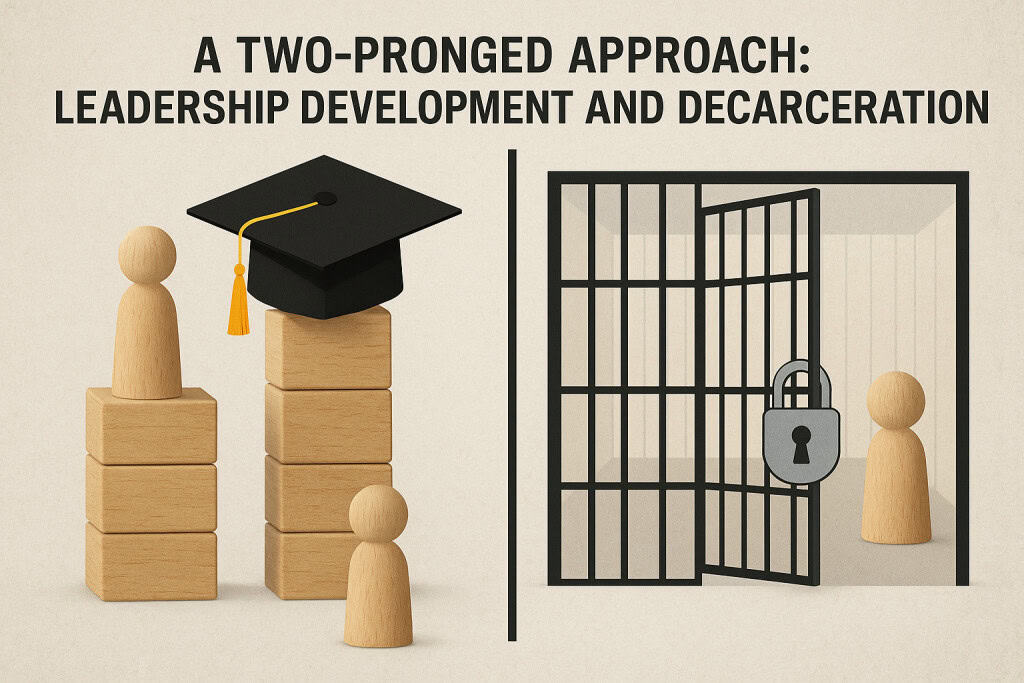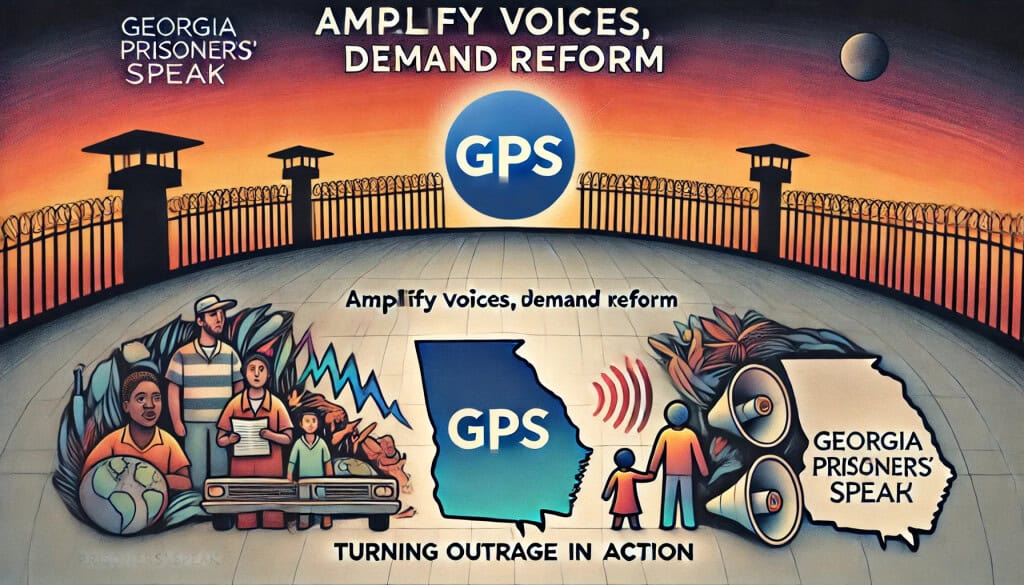Leadership is critical to the success of any organization, and nowhere is this truer than in managing correctional institutions. However, the Georgia Department of Corrections (GDC) is facing a crisis driven largely by decades of inadequate leadership development, insularity, and systemic corruption. Despite managing a $1.5 billion annual budget and nearly 50,000 incarcerated individuals, the GDC continues to appoint wardens and executives who often lack basic management qualifications and the comprehensive training required for such complex roles.
A Broken and Closed Promotion Pipeline
Georgia’s Department of Corrections maintains a rigid, insular system for developing prison leadership—one that begins at the entry level and rarely looks outside itself. Most wardens begin their careers as correctional officers and ascend through the security hierarchy—sergeant, lieutenant, captain—not through demonstrated leadership excellence or advanced education, but by surviving in a system that rewards tenure and familiarity over innovation or professional growth.
This internal promotion model is evident in recent appointments like Veronica Stewart, promoted to Warden of Washington State Prison in June 2024. According to the GDC’s own press release, Stewart began her career in 2007 as a correctional officer at Telfair State Prison and was promoted to sergeant in 2012 and lieutenant in 2014 1. Her progression, while reflective of long service, shows the pattern: a climb through security ranks with no mention of leadership education, managerial certifications, or outside experience.
Similarly, Mark Agbaosi, appointed in February 2025 to lead Dooly State Prison—a facility with over 1,700 incarcerated people and a multimillion-dollar annual budget—does not hold a bachelor’s degree 2. Yet he now oversees one of the state’s largest and most dangerous institutions.
Nationally, this is an outlier. Roughly 64% of wardens across the United States hold at least a bachelor’s degree, and many possess master’s degrees in criminal justice, public administration, or leadership-related fields 3. Leaders in comparably complex public agencies or private-sector organizations are typically required to have 15–20 years of management experience along with advanced education in areas like finance, human resources, or strategic operations 4.
Instead of aligning with these standards, the GDC relies on an insular training track that lacks depth and modern relevance. Current leadership training includes “Basic Correctional Officer Training,” “Sergeants Academy,” and “Basic Management Training” 5—programs which, by their very names, suggest a focus on entry-level security protocols rather than strategic, financial, or organizational leadership.
This closed-loop system creates a significant barrier to reform. It excludes outside candidates who might bring fresh ideas and proven models from other jurisdictions or industries. It also reinforces a narrow definition of leadership rooted in control and compliance, rather than innovation, accountability, or rehabilitative vision.
By failing to prioritize higher education, advanced leadership training, or external talent, Georgia’s prison system ensures its leaders remain locked in the same outdated mindset that contributed to the crisis in the first place.
Inadequate Training: Quantity over Quality
While GDC leaders undergo training, its effectiveness and depth are questionable. Officers frequently criticize internal training programs, especially online modules, for being ineffective and boring, often described as “just clicking through slides.” This kind of perfunctory training fails to instill meaningful leadership skills, leaving both lower staff and wardens unequipped to manage complex prison environments effectively.
The GDC’s typical training includes Basic Correctional Officer Training, Sergeants Academy, and Basic Management Training 5. Missing are critical topics such as advanced financial management, human resource strategies, crisis management, and modern leadership techniques—skills essential for running prisons that often have budgets upwards of $40 million per year.
Closed Doors, Closed Minds
The insular promotion system at GDC ensures that fresh ideas and external expertise rarely penetrate the leadership ranks. This “good ol’ boy” culture perpetuates outdated practices and resistance to change. Leaders are routinely reassigned rather than replaced, even after severe management failures. For example, Brian Adams, former Warden of Smith State Prison, was arrested on RICO charges for involvement in a drug-smuggling conspiracy 6. Such dramatic failures highlight how insularity can lead directly to corruption and chaos.
Georgia prisons have seen horrific consequences of this closed system, including rampant violence, severe understaffing, and widespread corruption. Between 2018 and 2023, Georgia prisons reported 142 homicides, with vacancy rates for correctional officers exceeding 50% 6. In 2024 there were 332 deaths with over 100 of those being homicides7. Such numbers starkly reflect systemic leadership failures.
Comparisons to Successful Organizations
Successful organizations deliberately blend internally developed leaders with external hires to introduce innovative practices and fresh perspectives. Companies and well-managed public institutions alike invest heavily in ongoing, high-quality leadership development, recognizing that leadership is not instinctual but cultivated through sustained, strategic effort.
In contrast, the GDC neither adequately develops internal talent nor recruits outside leadership. Top corporate executives or senior leaders of comparably sized public entities typically have comprehensive management training, including MBAs or equivalent qualifications, and experience leading diverse, multifaceted organizations 8. Georgia’s prison system leadership, dominated by those who have climbed from correctional officer ranks without substantive management education, starkly contrasts this successful model.
The Cost of Mismanagement
The leadership failures at GDC exact severe human and financial costs. Chronic understaffing and poor management directly contribute to dangerous conditions for inmates and staff alike. The DOJ reported 635 allegations of sexual abuse in 2022 alone, alongside tens of thousands of incidents involving contraband weapons and drugs 6. Such problems are symptomatic of ineffective leadership.
Moreover, taxpayers bear significant financial burdens due to lawsuits stemming from poor management. Georgia has spent nearly $20 million since 2018 settling legal actions over injuries and deaths resulting directly from administrative negligence 6. This financial toll highlights the dire need for capable, professionally trained leadership.
Building the Foundation: Education, Expertise, and the Future of Prison Leadership

Solving Georgia’s prison crisis requires more than new policies—it requires a new philosophy of leadership. The Department of Corrections must transition from a reactive, insular system to one that deliberately cultivates expertise and demands professional competence from its top ranks. This shift begins with acknowledging a simple truth: effective leadership is not improvised—it’s developed through education, experience, and exposure to new ideas.
Unlike other public-sector institutions, GDC has no clearly defined standards for leadership qualifications. Educational requirements are minimal, leadership development is sporadic, and outside expertise is often viewed with suspicion rather than embraced as an asset. To change course, Georgia must build a leadership culture grounded in three pillars:
1. Professional Education
Establish formal educational standards for warden and executive-level positions. At a minimum, senior leaders should hold a bachelor’s degree, with preference for those with advanced credentials in criminal justice, public administration, psychology, or organizational leadership. This will ensure that those entrusted with managing massive institutions and budgets have the academic grounding to do so.
2. Targeted Leadership Development
Design and implement rigorous, ongoing training programs that go beyond the current checkbox modules. These programs should cover modern correctional leadership principles, ethics, financial management, staff wellness, and trauma-informed administration. Leadership academies, mentorship initiatives, and executive coaching must become the norm—not the exception.
3. Open Pipelines and Diverse Talent
Break down the walls of GDC’s current promotion system by opening key leadership roles to external applicants. Bringing in experienced professionals from other states, sectors, or disciplines—education, healthcare, mental health, and nonprofit leadership—would inject new perspectives and proven strategies into a stagnant system.
This transformation won’t be easy, but it is essential. Without professionalizing its leadership core, Georgia cannot hope to reverse the violence, dysfunction, and corruption that have defined its prisons for far too long.
A Two-Pronged Approach: Leadership Development and Decarceration

Transforming Georgia’s prison leadership will not happen overnight. As experts in organizational development consistently point out, cultivating effective leadership pipelines—especially in large, complex systems—requires sustained investment over many years. It involves more than just filling vacancies; it demands a strategic commitment to recruitment, rigorous training, mentorship, and a culture of continuous improvement. Unfortunately, Georgia does not have the luxury of time. With violence escalating and public scrutiny intensifying, the Georgia Department of Corrections needs competent leadership now.
This paradox—that leadership takes time to build but is urgently needed—points to a critical, often-overlooked reality: Georgia must reduce its prison population in order to buy the time and space necessary for genuine reform. Decarceration is not an abstract ideal—it is a practical necessity. As Georgia Prisoners’ Speak has outlined in “Downsize to Rightsize: Georgia’s Prison Crisis Needs Urgent Action”, the state’s prison system is simply too large and too chaotic to manage effectively in its current form. Housing nearly 50,000 people across 38 facilities—with staffing vacancies exceeding 50%—has created a crisis that no amount of reactive budgeting or superficial training can fix.
In “Decarceration as a Solution to Georgia’s Prison Crisis”, GPS lays out a clear path forward. A deliberate and humane strategy to reduce the prison population would not only address immediate safety concerns but also enable the GDC to redirect limited leadership capacity and resources toward meaningful change. With fewer facilities and a smaller incarcerated population to manage, Georgia could:
- Shut down the most dangerous and ungovernable prisons, allowing the department to focus on stabilizing a smaller number of facilities.
- Improve staff-to-supervisor ratios, making it easier for experienced leaders to mentor rising managers.
- Create time for comprehensive training, without leaving critical leadership positions vacant.
- Recruit skilled administrators from outside corrections, including those with backgrounds in mental health, education, and public administration.
- Identify and invest in promising internal candidates, equipping them with the advanced skills needed to manage complex operations.
Leadership reform and population reduction are not separate goals—they are interdependent. Without decarceration, Georgia’s efforts to improve leadership will remain overwhelmed by sheer scale and institutional inertia. Without leadership reform, decarceration efforts may falter in implementation and oversight. Taken together, they offer a path toward lasting change.
The Department of Justice report has made clear that the status quo is indefensible. Georgia now stands at a crossroads: it can either design and implement its own bold reform plan or face the prospect of federal intervention through a court-ordered consent decree. GPS strongly urges the state to choose the former—by adopting a comprehensive, two-pronged approach that addresses both the systemic leadership vacuum and the unsustainable size of its prison system.
Without this broader vision, Georgia will continue to pour money into a failing system where unqualified leadership presides over a dangerously overcrowded population. The cost—in human suffering, public safety, and taxpayer dollars—will only continue to rise.

- https://gdc.georgia.gov/press-releases[↩]
- https://gdc.georgia.gov/press-releases/2025-02-16/new-warden-dooly-state-prison[↩]
- https://www.zippia.com/prison-warden-jobs/education/[↩]
- https://www.renaix.com/job-resources/ceo-qualifications-and-skills/[↩]
- https://gdc.georgia.gov[↩][↩]
- https://justice.gov[↩][↩][↩][↩]
- https://gps.press/gdc-mortality-statistics/#2024-mortality[↩]
- https://www.statista.com/statistics/1373848/nonprofit-ceo-compensation-annual-expense-us/[↩]

2 thoughts on “Unqualified and Unprepared: Leadership Failure in Georgia’s Prisons”